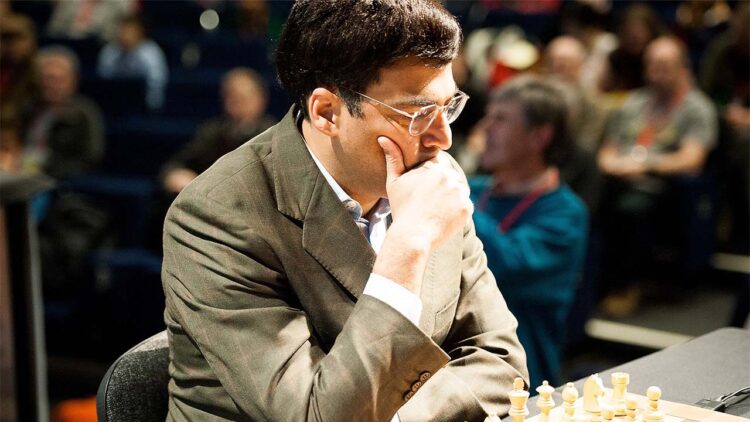Viswanathan Anand, affectionately known as “Vishy,” is a renowned Indian chess Grandmaster and a former World Chess Champion, and one of the best Indian chess players in the history of chess. His exceptional skill, sportsmanship, and influence on the world of chess have made him a household name. This article delves into five interesting facts about this legendary player, exploring his early life, rapid rise to success, and indelible impact on the chess world.
Last Updated:
Prodigy in the Making
Viswanathan Anand was born on December 11, 1969, in Chennai, India. He demonstrated a prodigious talent for chess from a young age, learning the game at just six years old from his mother, Susheela. By the age of 14, Anand had already become the youngest Indian to achieve the title of International Master. This early success foreshadowed the remarkable career that lay ahead for him.
Fastest Grandmaster in History
Anand’s rise to the top was nothing short of meteoric. In 1987, at the age of 18, he became India’s first Grandmaster. He earned the title in record time, requiring only three tournaments to collect the necessary Grandmaster norms.
This incredible achievement earned him the nickname “Lightning Kid” due to his exceptional speed and precision in playing the game. Anand’s rapid ascension to chess prominence inspired a new generation of Indian chess players and laid the foundation for India’s growing presence in international chess competitions.
A Reign of World Championships
Over the course of his illustrious career, Anand has claimed the World Chess Championship title on five occasions: 2000, 2007, 2008, 2010, and 2012. He achieved his first title in 2000, winning the FIDE World Chess Championship in Tehran, Iran.
Anand went on to win the undisputed title in 2007 in Mexico City, becoming the first player in history to have won the world championship in three different formats: Knockout, Tournament, and Match. His subsequent victories in 2008, 2010, and 2012 cemented his status as one of the greatest chess players of all time.
A Strong Advocate for Chess in Education
Anand’s impact on the world of chess extends beyond his competitive success. He has been a passionate advocate for incorporating chess into the educational curriculum, believing that the game can significantly enhance students’ cognitive and problem-solving abilities.
Through his work with the Vishy Anand Chess Academy, which he established in 2012, Anand has sought to promote the game in India and encourage young talent to pursue chess as a profession.
Prestigious Awards and Recognition
Viswanathan Anand’s contributions to the world of chess have been widely recognized with numerous awards and honors. Among these accolades are the prestigious Rajiv Gandhi Khel Ratna Award in 1991-1992, India’s highest sporting honor, and the Padma Vibhushan in 2007, the second-highest civilian award in the country.
Anand’s success and sportsmanship have also earned him the distinction of being the first recipient of the Global Strategist Award by NASSCOM in 2011, recognizing his achievements as an Indian icon and ambassador for the game of chess.
The Rivalry with Garry Kasparov
Viswanathan Anand has had several memorable rivalries throughout his career, but perhaps none as significant as his encounters with Garry Kasparov, the legendary Russian Grandmaster. Their first high-stakes match took place at the 1995 PCA World Chess Championship in New York, where Anand bravely challenged Kasparov but ultimately succumbed to the Russian’s prowess.
Their rivalry continued over the years, with Anand managing to secure several draws and even some victories against the chess titan. These intense battles against one of the greatest players of all time further solidified Anand’s reputation as a formidable competitor.
Embracing Technology and Innovation
Anand has always been open to adopting new technologies to enhance his game. He was one of the first top-level players to incorporate computer analysis in his training, which helped him stay ahead of his competition.
This forward-thinking approach has also extended to his involvement in the development of chess software and his support for online chess platforms. As a result, Anand’s career has been marked not only by his exceptional playing ability but also by his willingness to adapt and innovate in a constantly evolving game.
A Generous Philanthropist
Viswanathan Anand is known for his philanthropic endeavors, generously supporting various charitable causes throughout his career. He has been involved in numerous initiatives aimed at improving the lives of underprivileged children, providing educational opportunities, and promoting health and well-being. Anand’s philanthropic spirit, coupled with his extraordinary achievements on the chessboard, has made him a revered figure both within and outside the chess world.
A Lasting Legacy
Viswanathan Anand’s extraordinary career has not only shaped the landscape of Indian chess but has also left an indelible mark on the global chess community. His numerous achievements, sportsmanship, and contributions to the promotion of the game have inspired countless young players around the world. As a true icon of chess, Anand’s legacy will undoubtedly continue to influence and inspire future generations of players for years to come.
A Prolific Author and Co-Author
Anand has not only excelled on the chessboard but also shared his wisdom and insights through written works. He has co-authored several books on chess, including “My Best Games of Chess,” where he shares a collection of his most memorable games, complete with annotations and reflections. Anand has also written a personal memoir, “Mind Master: Winning Lessons from a Champion’s Life,” which chronicles his journey from prodigy to World Chess Champion and offers valuable lessons on success, strategy, and overcoming challenges.
The Ultimate Sportsmanship Gesture
In 2013, Anand displayed exceptional sportsmanship during the Candidates Tournament in London. In a game against Levon Aronian, Anand noticed that Aronian had mistakenly touched a piece, and according to the rules, he was required to move it. Rather than holding Aronian to the rule, Anand graciously allowed him to retract the move and make a different one. This act of fair play was widely praised and showcased Anand’s integrity and respect for the spirit of the game.
A Role Model for Indian Chess Players
Anand’s success and influence have led to a significant increase in the popularity of chess in India. Since becoming India’s first Grandmaster, he has paved the way for a new generation of Indian chess players, who have been inspired by his accomplishments and determination. Today, India boasts more than 70 Grandmasters and is considered a powerhouse in the world of chess, with Anand’s influence playing a key role in this transformation.
Unbeaten in World Rapid Championships
Viswanathan Anand’s prowess in rapid chess is well-documented, and his success in World Rapid Championships is further evidence of his dominance in this format. Anand participated in the World Rapid Championship four times (2003, 2012, 2017, and 2019) and remained unbeaten in all of them.
He won the title in 2003 and 2017, while finishing second in 2012 and third in 2019, showcasing his remarkable consistency and adaptability in rapid games.
A Chess960 World Champion
Anand’s versatility and creativity as a chess player are evident in his success in Chess960, also known as Fischer Random Chess. This chess variant, invented by former World Chess Champion Bobby Fischer, involves randomized starting positions for the pieces on the back rank.
In 2018, Anand won the Chess960 World Championship in Mainz, Germany, defeating fellow Grandmaster Peter Leko. This victory underscored Anand’s ability to excel in nontraditional chess formats, demonstrating his deep understanding and mastery of the game.
A History-Making Chess Olympiad Performance
In the 2004 Chess Olympiad held in Calvià, Spain, Viswanathan Anand delivered a history-making performance that showcased his exceptional talent and team spirit. Representing India on board one, Anand won the individual gold medal with a stunning score of 10 out of 13 points. His performance not only helped Team India secure a sixth-place finish, but it also marked the first time that an Indian chess player had won an individual gold medal in the Chess Olympiad.
Anand’s accomplishment at this prestigious event further solidified his position as one of the greatest chess players of all time and highlighted his ability to excel under pressure, even on the global stage.
Conclusion
Viswanathan Anand’s impact on the world of chess is undeniable. From his record-breaking rise to the top, to his reign as World Chess Champion, and his tireless advocacy for the game, Anand’s legacy will be remembered for generations to come. As a role model and inspiration for aspiring chess players worldwide, the “Lightning Kid” has left an indelible mark on the history of the game.
That concludes this list of facts about Viswanathan Anand. The summary provides a timeline of his life and achievements, as well as some interesting trivia you may not know about him. He is truly one of the greatest chess players to ever live.
If you liked this post, you may also like other list of facts on the best chess players in the world like the list of facts about Mikhail Tal or facts about Magnus Carlsen.


